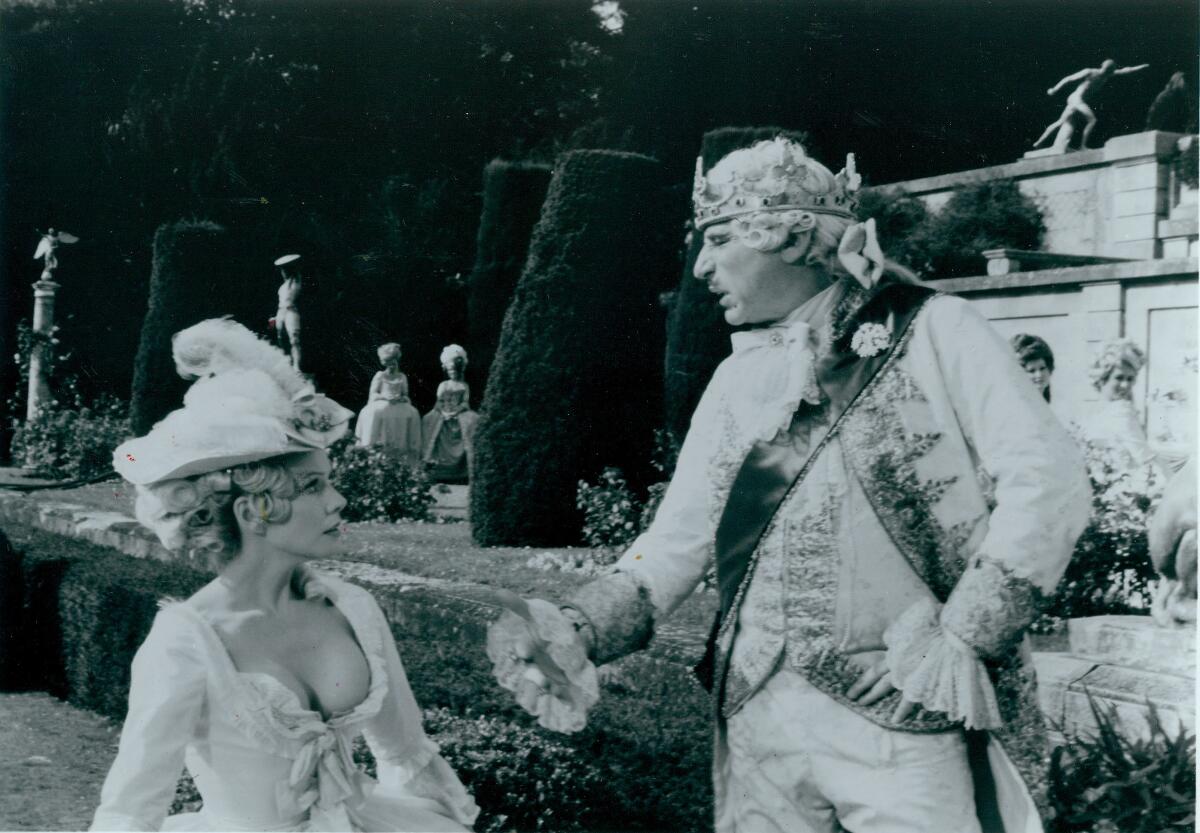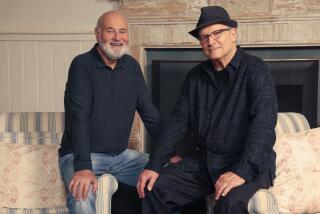From the Archive: Brooks’ ‘History’: The Formula Turns Sour

Where have Mel Brooks’ humors gone? Gone to self-indulgence, every one. To in joke and old joke and no joke and mostly gone off to bathroom humor, which seems to make up fully half of “The History of the World, Part I.”
In place of the lightning bolts of invention which made “Young Frankenstein” crazily perfect, there is a thunderclap of flatulence. This is the whoopee-cushion school of movie making, only on a grandiose scale. With Brooks as writer, director, producer and star (playing Moses, a Roman comedian named Comicus, Torquemada and a double role as Louis XVI and his commoner look-alike), surrounded by a Friars’ Club galaxy of comedic cronies, who was to say him nay? if you look very, very fast, you can find Sid Caesar, Howard Morris, Dom DeLuise, Harvey Korman, Charlie Callas, Henny Youngman, Pat McCormick, Ronny Graham, Jackie Mason, Shecky Greene, Andreas Voutsinas, Rudy DeLuca, Fritz Feld, Jack Carter, Jan Murray, Spike Milligan and several dozen more. The female side includes Madeline Kahn, Bea Arthur and Cloris Leachman.
Presumably everyone was so busy doing shtick and reacting off each other that there was no one left to mind the story and to say, “Not funny.” Not only not funny, but a big, overblown, crashing bore, fellas.
Brooks works under some seal of immunity now, or the assumption that he has one. It’s the only explanation for the racism and homophobia that dog “History.” By now Brooks’ Jewishness jokes are getting to the point where the Anti-Defamation League might register seismic shock. The fine line has always been who made these jokes. Presumably they were tolerable when made by Jews about Jews. Brooks seems to have exceeded this amnesty by an uncomfortable margin.
And the level of Brooks’ humor has calcified at the 9- to 11-year-old level, pre-sex, pre-potty; bathroom humor without the humor. It’s like that catalogue song from “Hair”: masturbation, elimination, urination, defecation, leading his audience through humiliation to resignation and finally alienation.
The film has four ages and stages with Orson Welles’ sonorous self-parody narration under all. It opens with yet another Dawn of Man, “2001” Zarathustra music knock-off. The joke here is masturbation. Then we meet the Cave Dwellers, whose almost every gag has been exceeded by “Caveman” in better, funnier costumes. Sid Caesar has a few brief, nice mimed moments before we are plunged into the ennui that was Rome.
There, Bea Arthur has its grandest moment as an officious Roman unemployment agency clerk, then it’s straight to the toilets from which we almost never emerge. Flatulence Jokes, [Homophobic] Jokes, Hollywood In-Jokes (Brooks’ agent’s name is Swiftus). The arrival of Madeline Kahn on a litter as Empress Nympho is a hoped-for high point. But as written it’s a Mae West caricature which gives the delicious Kahn perilously little to work with. The film’s few fast gags (a kid in the marketplace who jives by with an outsize transistor blasting out “Funky Time,” a kvetching Moses, and Moses and the 15 Commandments) are undermined by the relentless unfunniness surrounding them.
All the ticklish detail, the V and X Cent store, add up to nothing, “The Monty Python’s Life of Brian” had more rapid-fire period humor in one sequence than this whole heavy film. And it made salient points at the same time: the perilousness of following any leader blindly being only one of them.
And even though it’s not hard to remember that pain — or the threat of it — runs like a fever through classic film comedy, the “History of the World” pain is on an unpleasant level. Boulders crush cavemen’s toes, again and again; there are references to red-hot pokers applied rectally as torture devices. It feels nasty, not rib-tickling.
Where the film veers into its few minutes of funniness are what Brooks has always — almost always done well: parodies of other movies. As a boat leaves for Jerusalem (with El Al sails), the principals do a Hope-Crosby-inspired song, “We’re off on the road to Judea ... “
In the Torquemada torture scene, in which all the monks turn into tap-shoed chorus boys, the joke is the Esther Williams water ballet takeoff, which is funny. (But that little chorus girl-nun in the middle moves a second too soon and gives away the fun, the breakaway habits, revealing Catalina swimsuits and ‘40s-style bathing caps.) Brooks has these spectacles exactly on target, from the preening backstroke to the finale as the swimming chorines emerge from the pool to form a living menorah, complete with sparklers. Savor this bit; it’s little enough to be grateful for and it has to hold you until the very end of the film.
A few of the principals emerge unscathed. The pearly pink Pamela Stephenson, in the French Revolution sequence, has fun with the young woman hellbent to give up her virginity to save her father, Spike Milligan. Milligan, doing a sort of “Prisoner of Zenda/Tale of Two Cities” amalgam, is unsinkable, and Gregory Hines as the Roman dancing slave, Josephus, gives perhaps the most memorable performance, opening with a sandled soft-shoe, which seems boneless.
Saddest of all is the lack of growth of Brooks’ succeeding works. “The Producers” and “Young Frankenstein” had brilliantly funny moments and bad taste so monumental it was inspired. But this film reworks the “Blazing Saddles” campfire scene; the “Producers” “Springtime for Hitler” number, and the film references of “High Anxiety” and “Silent Movie.” There are no new leaps of excitement, what we’re offered is the shock of the old. What you must do now to be a member of Mel Brooks’ club is to prove your hipness by not being offended by cruelty, crudeness and wilted, elderly jokes.
It’s enough to bring out the Puritan in the least Puritanical of us. More’s the pity.


